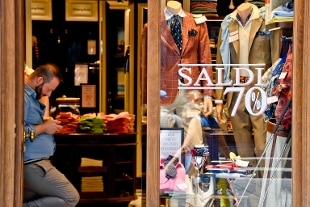Sicily, loans at usurious rates to merchants in crisis, loan shark arrested
Arzano: the municipality imposes a lockdown, traders protest with a road block
Share
06 March 2021 The twelve months of the pandemic cost Italy a reduction of 183 billion euros in GDP and 137 billion euros for consumption, 36 of which due to the absence of tourists;
enough to bring spending back to 1997 levels, a step back 24 years.
These are the accounts contained in the Dossier "Businesses in the pandemic: March 2020 - March 2021", prepared by Confesercenti.
In the period 262 thousand self-employed workers lost their jobs, according to traders, without interventions in 2021 they risk closing 450 thousand companies.
The loss did not affect all expense items equally.
Expenditure in hotels and restaurants (-46 billion euros) and transport (-28.2 billion) fell above all.
Significant reductions also affected cultural and recreational consumption (-17.3 billion) and fashion (-13.1 billion).
From an occupational point of view, trade, administration and tourism recorded, in 2020 alone, a decrease of -192 thousand independent, for cultural and recreational activities the decrease is instead of -13 thousand.
The loss of consumption and gross domestic product was caused, in the first place, by the restrictions on the activities and movement of people implemented to contain the spread of the virus, from the lockdown to the classification by zones and risk bands by region.
Considering only the market services, during this pandemic year about 2.6 million companies were subjected to limitations, for different periods by region and sector of activity: ranging from a minimum of 69 days of complete closure to a maximum of 154 days for public businesses in the Autonomous Province of Bolzano.
On average, the public establishments were closed completely for 119 days.
The traders are now asking for an intervention with the Dl Sostegni that overcomes the criticisms encountered in the previous 'refreshments' and that finally abandons the criterion for selecting companies through the ATECO code, which has unjustly excluded entire supply chains, leaving them without any form of help, as in the case of suppliers - including services - for the Horeca and Wedding sectors.

